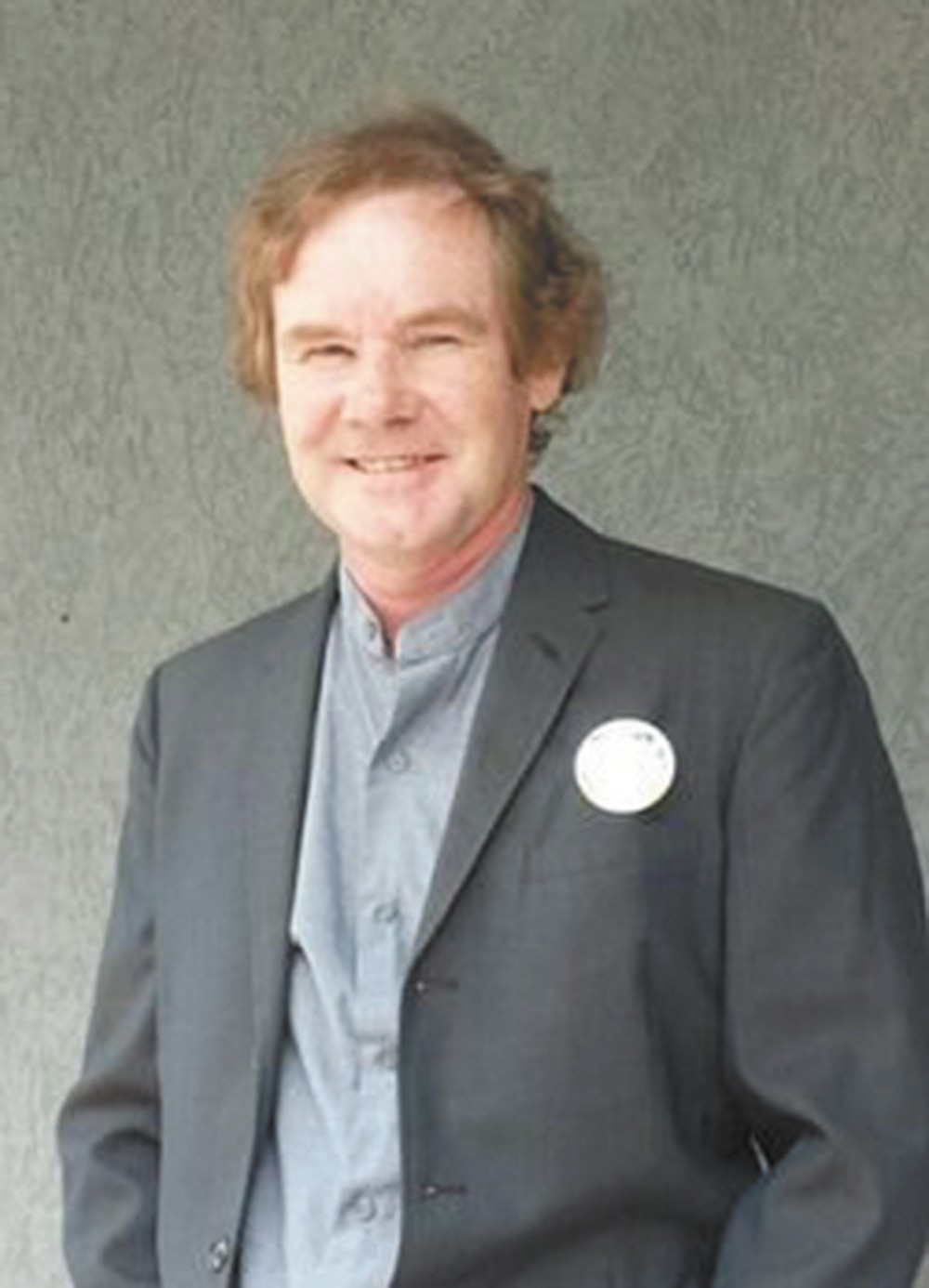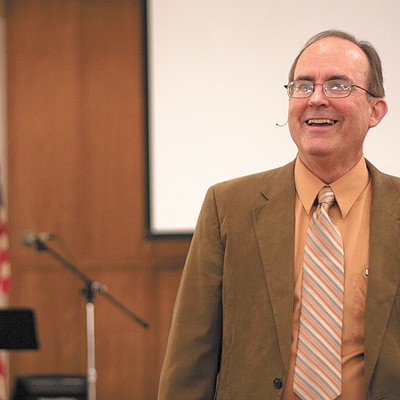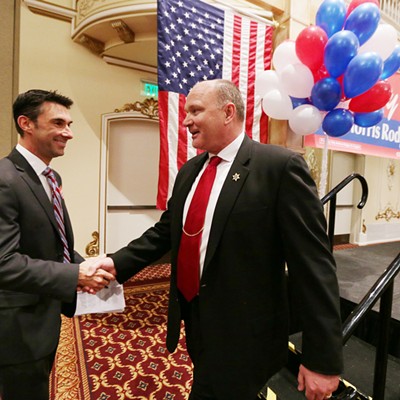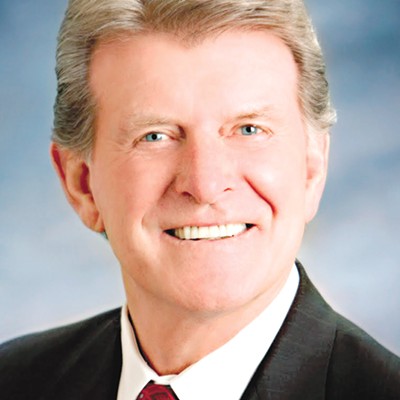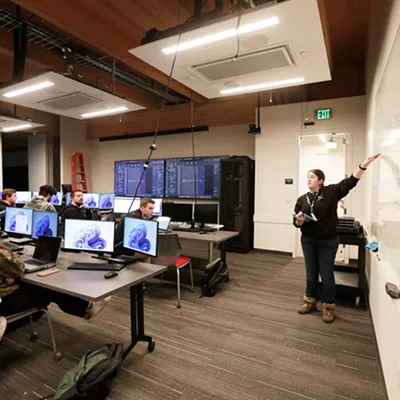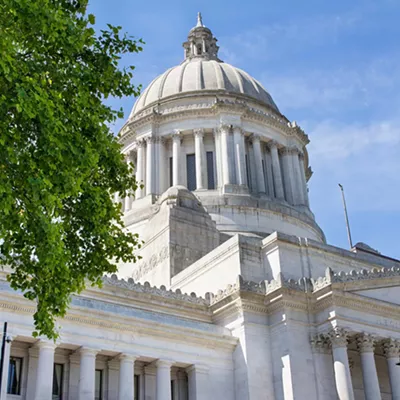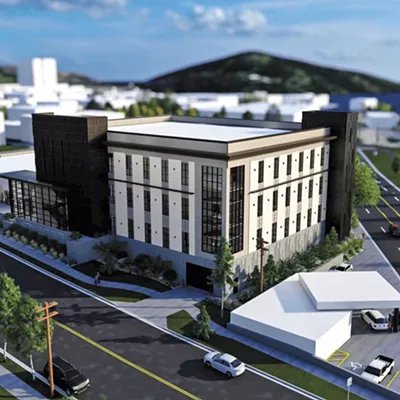Seeking his second term, Republican incumbent Jeff Holy faces Democratic challenger Ziggy Siegfried, a write-in candidate who earned a place on the November ballot after receiving a little more than 500 votes in the primary. Holy, an attorney and veteran of the Spokane police force, is a social and fiscal conservative whose priorities include reviving Spokane's manufacturing industry and improving public safety.
In Holy's first term as a state representative, two of his bills were signed into law: One extended the statute of limitations for sex offenses against children; the other expanded the definition of contraband so that it included the Special Commitment Center for sexually violent predators. Siegfried is a maintenance worker at Washington State University's Riverpoint Campus and longtime local activist. He's been involved with the Occupy movement, coal and oil train protests, and Spokane Moves to Amend the Constitution, a group that wants to get money out of politics. A self-described member of the working class, Siegfried promises to protect low-wage families and the "99 percent."
Candidate Q&A
If elected, what will you work to accomplish in the Legislature next session?
Jeff Holy (Republican): Providing an infrastructure that would attract an "anchor" manufacturing employer to the Spokane region that would in turn attract subcontractors and supply-based industries supporting the manufacturer. Economic development is a goal that is of great value to our region, easy to communicate and simple to focus upon.
Ziggy Siegfried (Democrat): Definitely the funding for education — both K-12 and higher education. I work in higher education and I don't plan on totally leaving my job since the Legislature is a part-time job. … Definitely higher family wages. I don't know if we could push for $15 statewide, but I think Spokane needs a higher minimum wage than what it’s got.
The Legislature is obligated by the state Supreme Court to fully fund K-12 education by 2018. How can the Legislature keep good on this promise while facing a projected budget shortfall? Would you support any plans for increasing the state’s revenue?
Holy (R): The September revenue forecast projects additional revenues of almost $3 billion over the 2013-15 budget cycle. This is not a budget shortfall; this is a gross revenue increase pushing 10 percent. Our side of the aisle tried to do the right thing last time and create a separate budget for K-12 education and fund education first as directed by our Supreme Court. Obviously, we weren't convincing enough. So we will try to do the right thing again this session.
Siegfried (D): Possibly [implementing] an income tax on the higher income and making sure corporations are paying their fair share. Getting rid of some of the tax loopholes — like if Microsoft buys a corporate jet, they don't have to pay sales tax on it, but we have to pay sales tax when we buy a new car. … I think we have to get rid of non-residents not having to pay sales tax. I think out-of-state people, if they want to come visit, they have to pay our sales tax.
Without additional sources of revenue, state agencies will be forced to cut funding to balance the 2015-17 budget. In your opinion, which programs and services can afford these budget reductions? On the other hand, which programs and services would you strive to protect from these cuts?
Holy (R): State employees have been trying to do more with less for many years now. They are providing the maximum amount of services they can, in consideration of the increasing responsibilities assigned and finite resources available. That being said, when additional services aren't affordable and the legislature is not allowed the discretion to manage resources as per the Supreme Court's McCleary decision, we are forced to identify and focus on providing those priorities of government that are fundamental. I will honor the Washington state constitution and address education first, then basic infrastructure, public safety and the truly vulnerable as base priorities of government.
Siegfried (D): I don’t know the full workings of all of what’s in the budget because I haven’t been in state government before. I’d have to study that when I get there and talk to [Washington state Representatives] Marcus [Riccelli] and Timm [Ormsby] and Kevin Parker, but I wouldn’t want any cutbacks on social services because we need to keep our social safety net there. I know a lot of people who depend on the social safety in the state.
Would you support Gov. Inslee’s proposed carbon emissions tax and/or cap-and-trade system? If not, what, if anything, should Washington do to cut greenhouse gas emissions in order meet the carbon-emissions reduction targets set by the Legislature in 2008?
Holy (R): Most decisions as to making a social statement, such as our state standing alone to address carbon emissions, are made as result of a simple cost-benefit analysis. What is not often considered during the course of taking such a moral position is the risk analysis derived from examining the direct and unintended consequences of something as impacting as a carbon emissions tax. The cost to all aspects of business, including operations, production, transportation, and derivative costs to all Washington residents resulting from these increased business costs need to be reexamined. Looking at the funding question you posed immediately above, the impact of creating a carbon emissions tax, also creating an incentive for business to flee our state, seems rather counterproductive.
Siegfried (D): I’m definitely supportive on that. I think we need to do something about climate change. If we don't do something about this, it’s going to cost us a lot more down the road. … We’re in a sort of lucky spot, so it’s kind of easy for people to overlook what we’re going to be facing, and those costs are going to be a lot more than what it would cost for a carbon tax.
As Washington faces a looming doctor shortage, Washington State University is asking the Legislature for $2.5 million to establish its own medical school. Would you support this request from WSU? If not, what’s your plan for filling this growing need in our health care industry?
Holy (R): After attending several meetings on this topic, I expect a very well-prepared and detailed presentation from both WSU and [the University of Washington] on this topic during the coming session. Both schools are moving to meet the age-wave-driven need for medical services. It's a relief that this issue is finally getting the attention it deserves.
Siegfried (D): Definitely. I think it’s a great idea. We got a good school going with the nursing and and bio-med building that came on this past year. We have a pretty great campus there and that would be a great addition to it. I would love to see ways of relieving some of the tuition debt on the people who are training to be doctors. If they agree to put in time in small rural communities, I think it would get their debt paid off sooner and get doctors into rural communities, because they usually have a big shortage of them.
As the recreational marijuana industry continues to grow, what reforms would you support to the medical and/or recreational markets?
Holy (R): I'll attempt to direct an adequate portion of the marijuana tax revenues toward public safety so as to front-load the coming costs attendant to all aspects addressing recreational use of an additional social intoxicant, including both enforcement and as a community caretaking function. Detox, rehab, jail, overdose issues and medical services all come into play.
Siegfried (D): I definitely supported legalizing it even though I’ve never smoked before in my life! ... I’d have to talk to my friends who have worked with the issue more than I have. If there was going to be any changes, there would be a lot of people I’d want to consult on how to make it work better.
After accepting $8.7 billion in tax breaks, Boeing recently announced it will move 2,000 jobs to Oklahoma City and St. Louis. What incentives should Washington offer to big businesses to keep them from moving jobs out of state?
Holy (R): Conversations are circulating about the drafting of business tax incentive accountability legislation, as public awareness on this topic increases. However, neither a topic nor a solution is ever as simple as this question would suggest.
Siegfried (D): I don't know. If giving them that big tax break didn't work to keep them here, maybe some of these tax breaks aren't a great idea. … Review them — each tax break. We have to review whether it’s going to actually keep the jobs here, which the Boeing tax break did not. We have to be sure before we're giving them tax breaks that it’s going to keep the jobs here and it’s going to be, like [6th District Senate candidate] Rich Cowan says, a “net gain” for us.
Here at the Inlander, we’ve written extensively about the cracks in our mental health system. Our stories have touched on the burden of mental illness on the criminal justice system, punitive conditions at Eastern State Hospital, psychiatric boarding and the difficulty of getting care in rural areas. What specific steps would you support to improve mental health care in Washington?
Holy (R): Mental health ultimately becomes a public safety issue when needs aren't served. The Spokane County Jail on average is the second to third largest mental health services provider in Washington. When services aren't met, those with mental issues most often end up in jail. This solves nothing. First priority in addressing needed services is to acquire the medical staffing necessary to make use of currently existing public, institutional, social services-based and private facilities available.
Siegfried (D): I’d have to consult with more of my friends with what would be the best solutions. I'm not totally up on the mental health thing. … I have a lot of friends who do work dealing with those problems. I’ve had such extensive work in so many issues that even the ones I’m not totally up on and know the solutions to, I know the people I can speak to who can help me find solutions.n


